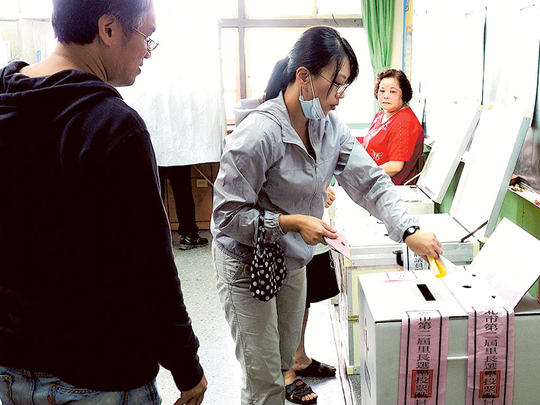
TAIPEI: Taiwan’s Beijing-friendly ruling party was facing a rout on Saturday as voters went to the polls for the island’s biggest ever local elections, a key test ahead of the 2016 presidential race.
Opinion polls suggest the Kuomintang (KMT) are heading for heavy losses as they struggle with growing fears over Chinese influence, a slowing economy and a string of food scandals.
The local vote is seen as a barometer for leadership elections due in early 2016, with China policy a key issue. Embattled President Ma Ying-jeou — who came to power in 2008 on a Beijing-friendly platform — must step down at the end of his second four-year term.
Counting is under way after the polls closed at 4pm (0800 GMT), with early indications of results likely to emerge early on Saturday evening. The official result is due to be announced at around 11pm (1500 GMT).
A record 11,130 seats at every level of local government are up for grabs, with 18 million people eligible to vote. Turnout was expected to be between 65 and 70 per cent.
Voters lined up at polling stations from early morning and roads, train and bus stations were jammed as people returned to their local neighbourhoods to cast their ballots.
The KMT faces humiliation in significant strongholds, including Taipei and the central municipality of Taichung.
“Many young people are concerned about job prospects and high housing prices so I hope to see change and new thinking in the government to make things better for us,” graduate student Mark Hsu told AFP outside a polling station in the capital.
Taiwan and China split in 1949 at the end of a civil war but Beijing still claims the island as part of its territory awaiting reunification, by force if necessary.
Ma has overseen a marked improvement in previously frosty ties between Taipei and Beijing since he ended the Democratic Progressive Party’s (DPP’s) eight-year rule in 2008 on a platform of boosting the economy and trade with China.
However, the public has grown increasingly anxious over China’s influence on the island.
A proposed trade pact with the mainland sparked mass student-led protests and a three-week occupation of Taiwan’s parliament earlier this year.
“I support the DPP because I think the Ma government is leaning too close to China and opening up trade too much ... many factories have moved to China and many Taiwanese young people can’t find jobs,” a retired businessman surnamed Hsiao told AFP at a polling station in Taipei.
The DPP has traditionally been sceptical over closer ties with Beijing and has criticised the KMT for lack of transparency over trade deals with China.
But KMT supporters fear rocking the boat with Beijing.
“I think stability is the most important thing because if the DPP were to regain power, ties with China would become tense again and that would be bad for the economy,” said office worker Chin Hui-wen in Taipei.
The KMT currently dominates 15 of Taiwan’s 22 cities and counties, while the DPP holds seven.
Of the six larger municipalities — the most hotly contested seats — the KMT controls three in the north and one in the centre, against the DPP’s two in the south.
President Ma smiled and waved at reporters as he voted in Taipei, but made no comment.
DPP chairwoman Tsai Ing-wen said she was “confident” about the election, speaking outside a polling station in central Taiwan.
Around 60,000 policemen were mobilised across the island, authorities said, with barbed-wire barricades outside the presidential office.
Taiwan has experienced sporadic election violence, with two high-profile shootings at election-eve campaign events in recent years.












